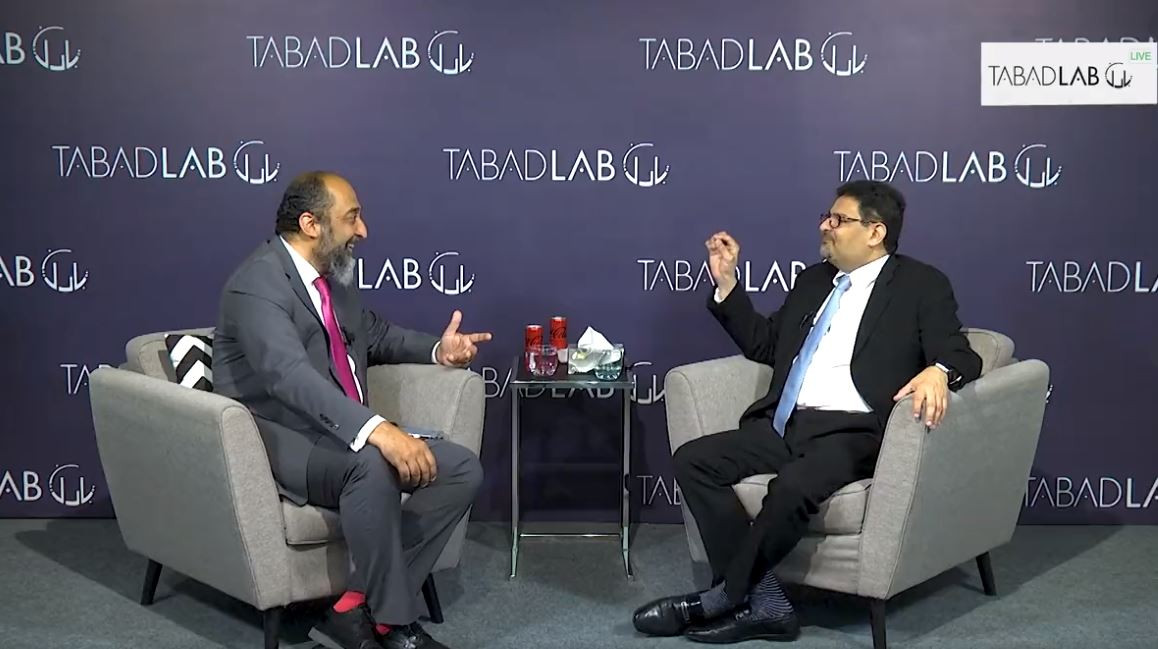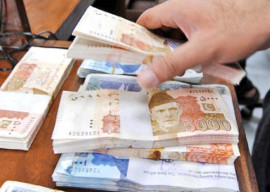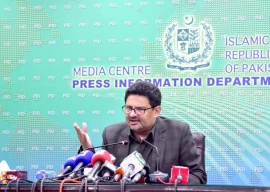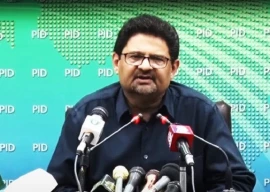
Finance Minister Miftah Ismail on Tuesday said that the country will not default as an increase in the inflow of foreign currency is expected in the next quarter.
The minister made the remarks during a conversation with the CEO of advisory services firm Tabadlab, Mosharraf Zaidi, where he stated that he, the governor of State Bank and Prime Minister Shehbaz Sharif were all certain that Pakistan will not default because “all the balls that [they] have in the air” are expected to land in place and an increase in the inflow of foreign currency is expected in the next quarter.
He emphasised the need to send a “positive signal” to markets.
#SneakPeak
— tabadlab (@tabadlab) July 26, 2022
Finance Minister @MiftahIsmail was featured on the latest Tabadlab Live with @mosharrafzaidi. Full video coming soon! pic.twitter.com/rjetvslDwe
Echoing the same sentiments, the minister took to his official Twitter handle today to share JP Morgan's special research report on Pakistan, wherein the investment banking company has stated that "Pakistan will not default in its payments."
Miftah said: "With austerity and reform measures taken in the budget and since the budget, the IMF agreement and progress with other multilateral institutions, our bonds are a safe and smart investment."
Pakistan Will Not Default On Its Payments Says JP Morgan.
— Miftah Ismail (@MiftahIsmail) July 27, 2022
With austerity and reform measures taken in the budget and since the budget, the IMF agreement and progress with other multilateral institutions, our bonds are a safe and smart investment. https://t.co/cJeq124cGL
During his talk with Zaidi, he highlighted that in the last year, Pakistan had an import cost of $81 billion whereas imports stood at only $31 billion this year.
Read Miftah confident pressure on rupee will reduce from next week
“I’m trying to moderate our purchases while not slowing down our exports. For the next two to three months, I’m going to do that,” he said, adding that he had an increasing grip on foreign currency.
He maintained that a new policy plan will be implemented to aid a gradual decline in imports and an “organic” increase in exports.
#TabadlabLive
— tabadlab (@tabadlab) July 27, 2022
𝐂𝐫𝐢𝐬𝐢𝐬 𝐄𝐜𝐨𝐧𝐨𝐦𝐢𝐜𝐬 𝐢𝐧 𝐚 𝐓𝐢𝐦𝐞 𝐨𝐟 𝐄𝐱𝐭𝐫𝐞𝐦𝐞 𝐏𝐨𝐥𝐚𝐫𝐢𝐬𝐚𝐭𝐢𝐨𝐧
featuring Dr Miftah Ismail (@MiftahIsmail) and Mosharraf Zaidi (@mosharrafzaidi)https://t.co/Ytx7AjNybG
The gap in import-export and the resulting dollar liquidity has increased pressure on the Pakistani rupee, which has been decreasing in value against the US dollar.
Earlier today, the Pakistani currency continued to sink for the seventh consecutive working day as it slumped by Rs4.07 to a new all-time low of Rs237 against the US dollar in the inter-bank market.
“It’s no fun going to the world, to the International Monetary Fund (IMF), to the Chinese, to the Saudis, asking for money,” the minister stated.
He claimed that the inflows from the IMF will emerge within weeks because there was no chance of the Fund reopening the loan negotiations.
“There’s no prior action that’s left. The only thing is that they have a vacation for the [IMF] directors from Aug 1 to Aug 15. That’s why the meeting is a little later than I would’ve liked,” he explained.
'Prepared govt'
When asked whether his government was well prepared, Miftah claimed that the team was “very well prepared” and had been discussing the ongoing problems even before his party came into power.
“Before we entered the government, we were prepared and aware of the persistent problem of Pakistan having a boom-bust cycle and had determined that the first thing the government would have to do would be an increase in petrol prices,” he stated.
Read More IMF slashes global growth forecast
He maintained that he had been aware from the first day that $21 billion had to be paid back next year, while the government reserves stood at $10.3 billion.
“I flew to the IMF to request an MeFP [Memorandum of Economic and Financial Policies] and they said no and asked to see a budget plan,” he said, outlining that the global moneylender had required a halt in subsidies on petrol, diesel and electricity as was “typical for IMF programmes”.
He detailed that the incumbent government had come up with a budget plan, which had helped raise Rs6,100 billion last year and they planned on raising another Rs7,500 billion next year.
The minister highlighted that revenue was increased by 33% as the PML-N led-government understood the “need to curtail current account deficit to stop the draining of foreign exchange”.
“The quantum of the challenge is very large and we need time to get things done,” he said, mentioning the premier’s trips to Saudi Arabia and Abu Dhabi. “The results are what matters,” he added.
According to the minister, the petrol prices of Rs150 per litre under former prime minister Imran Khan were unsustainable and would have had worse effects.
“Increasing petrol prices by Rs120 when Imran Khan is out on the streets, you are facing adverse and there was a significant negative effect on the people of Pakistan,” he admitted.
Read Also Govt jacks up power tariff by Rs3.50 per unit
However, Miftah maintained that international petrol prices were rising and a subsidy on costs would have led to a default, which is what “happened in Sri Lanka”.
“In February, Sri Lanka and Pakistan were subsidising petrol and the government was unconcerned about sound economics because of their populist behaviour,” he said.
Miftah claimed that the new government had to make tough choices and though his party advocated for a swifter change, the coalition government took time to reach an agreement causing the increase in petrol prices to come a few weeks after the current government came into power.


1725612926-0/Tribune-Pic-(8)1725612926-0-165x106.webp)

















COMMENTS (3)
Comments are moderated and generally will be posted if they are on-topic and not abusive.
For more information, please see our Comments FAQ